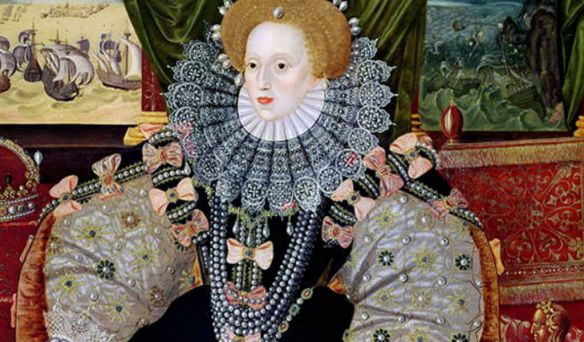
When Elizabeth I (1533–1603) was crowned queen in 1558, England was, compared to other European nations, a poor and backward country. At this time England was deeply divided by religious strife. It was too weak to protect itself from its enemies, lacking a strong military. Furthermore, England had been too beleaguered by its conflicts to participate in the Renaissance, the great artistic and intellectual movement that had swept Europe beginning in the fourteenth century. The people of England must have wondered what the inexperienced twenty-five-year-old queen could possibly do to strengthen her nation.
Nonetheless, when people today think of the Elizabethan Era most envision the dazzling, red-headed queen skillfully reigning over a vibrant court lively with music and dance, splendid costumes, and dashing young statesmen, explorers, and artists. Soon after she took the throne, Elizabeth’s moderate religious settlement eased some of the divisions between Protestants and Catholics that had been tearing the nation apart, providing England with a stability that allowed it to grow in many directions. During Elizabeth’s reign commerce flourished. London became one of Europe’s largest and greatest cities. The era produced unparalleled advances drama, and not surprisingly, the Elizabethan Era has become known as the age of Shakespeare in honor of its leading dramatist and poet. There was growth in other spheres as well. As the new middle class developed, public education advanced, and England experienced a higher level of literacy than ever before. This made it possible for people who were not born into the nobility to rise in position. Elizabeth’s reign also marked the beginning of English exploration of the New World. Militarily, Elizabethans restored England to its place as a major European power. When the Spanish Armada arrived in the English Channel in 1588 hoping to invade England, Elizabeth’s small but highly skilled navy was up to the task of defending the small island from the world’s largest power. The English people celebrated the victory with a new sense of pride in their nationality.
Historians differ greatly over how much credit to give Elizabeth for all the advances that occurred during her reign. Many elements of change were clearly already in process. Although we will probably never determine the extent of her contribution, her story has nevertheless fascinated historians worldwide for centuries after her death. The story of Elizabethan England provides valuable insight not only into English history, but also into the transition of Western society into modern times.